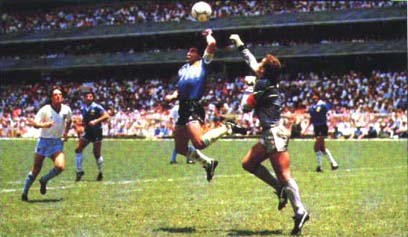|
the men in
black
-
Focus on Football Referees
-by gasper crasto
From
Brazil to Portugal, Calcutta to Goa, Kazhakastan to Kuwait, the men in
black in football are always under fire - from all sides, often for
alleged incompetence, sometimes for skeptical blunders.
First of all, the nice thing about football is that it is - or is
supposed to be - the same everywhere in the world. Yet refereeing
standards and even interpretations vary from country to country. A
slight push or harmless tackle in the penalty area in some part of the
world (as seen in games and watched on TV) is sometimes given a
penalty, whereas in other parts, you can often butcher a guy in the
penalty area and not hear a whistle.
The Italian referee Pierluigi Collina who officiated in the 2002 World
cup final is seen by many to be one of the world's best referee and
most fearsome (Fearsome, perhaps because, with his distinctive bald
head, sunken eyes and creepy expressions, Mr. Collina is a classic
post-mortem ghoul who looks as if he's just been dug-up). Our own Goa
has produced outstanding referees such as Peter Rodrigues and Anthony
DCosta who managed to create terror on the football field before they
had even blown the whistle. Ex-FIFA Referee, late J. P. DMello, and
famous International referee Melwyn DSouza too I am told were world
class referees.
Amateur Indian Referees doing the duty in Kuwait may not fall anywhere
near to professional standards, but they too are considered the Indian
Expatriate football worlds - men in black, the ones with all the
power on the football field. But these part-time hapless wonders do
not always receive due admiration for their generous efforts.
It is a referees job to keep the game flowing and to make it as
safe as possible for the participants, but it is not as easy as many
people seem to think. The referee is faced with 22 men kicking a
ball around, most of whom, want to win at any cost (which includes
cheating, physical intimidation and even, sometimes, excessive amounts
of skill). Part of the referees task is to protect those who want to
play from those who want to kick lumps out of their betters. They are
expected to make split-second decisions, placate angry participants,
and display a superior knowledge of the laws of the game, where
necessary caution or send-off is warranted. (It's a dirty job, but
someone's got to do it).
As an individual (a player, referee myself, a spectator) I have many
opinions on the consistency, abuse and the standard of refereeing in
local games and in the world in general.
As a player
Each player would like every referee to come out and give the best
decisions match in and match out, but it just doesn't happen. Why?
Well, each referee is different; each has his own view of whats
acceptable and whats not. Each of us sees the game differently. The
centre referee has to keep his eye on all that is going on, but from
other parts of the field or from the touch line we get a completely
different view, one that makes you see and hear the frustrations of
club officials and supporters.
Referees are only human and like any player they too make mistakes and
have bad games. Some referees call many fouls while others don't. It
totally depends on each referee's personality. But, certainly, after
games it is easy to be critical of referees in hindsight, and I think
referees do make some blunders.
But, in every sport, mistakes occur, so we have to accept that. I
understand some player's anger though, especially when decisions are
silly. However, even if referees actually made mistakes, we
shouldn't complain and go on about it forever because people who have
played football should know the results aren't going to change.
As a referee
As a referee, at any point - and if I so desired - I could pick up the
ball and walk away. Match abandoned. I can stop players leaving the
field or coming back on. I can order men to remove their wedding rings
or other jewellery (even if I dont consider them dangerous). I can
even deny someone the right to participate in the match because I
think he is not properly attired. In short, I say what goes. It is my
kingdom and I am all powerful. Of course I don't always exercise my
might because I am a generous person in charge, and I'd like to keep
all my teeth! Generally I affect a suitable compromise. And anyway,
who'd want to spend their Friday mornings being abused by twenty-two
football players, and their supporters?
Conclusion: Officials cannot freely officiate if they labor under
the threat of intimidation and assault by players and officials.
As a spectator
Whenever I am watching a game, I usually concentrate on players'
performances and don't pay much attention to referees. So, I think
they are doing well unless there is a deadly mistake and the ref is at
the centre of everybodys attraction. But even if they dont do any
mistakes, referees have to withstand frequent tirades of abuse.
No matter how best the referee tries to be, we find matches are loaded
with dubious, match-changing decisions, including being sent off
unnecessarily, and legitimate goals or off-sides disallowed. Some of
the referees are guilty of grave blunders, notably denying even
match-winning goals.
Are referees just bad? No. You find even the best and most accepted
referees make totally wrong decisions. But what is a wrong decision?
Some cases are clear. But most are controversial. Many of the
controversial situations are in a grey area that has to be interpreted
and can be either interpreted this or that way. This is a property of
the game.
People who play football have for a long time accepted that the
referees decision is final, even when he's wrong. But there are
some who display dirty unsporting spirit even after having played for
donkey years (and having a history of representing reputed outfits).
Rightful goals or handballs in the penalty area (unnoticed by
officials) are sworn denied, and later the same players are heard
boasting in public about fooling the referees.

Most famous sporting picture in
the world, Maradona's Hand of God
Happily, controversial episodes shape football hugely all the time in
almost every other game, but only the world famous are remembered.
Fans still discuss whether the ball crossed the line after hitting the
crossbar (off a shot by Englands Geoff Hurst for the controversial
3-2 lead in extra time) in the 1966 World Cup Final between England
and West Germany which England won 4-2; or how Diego Maradona got away
with his 'Hand of God' goal against England in the 1986 World Cup.
Every supporter has a hard luck story, and these only add to the game.
In the 1990 World Cup, the Germans triumphed when Andreas Brehme
converted an 85th-minute penalty awarded by Mexican referee Edgardo
Codesal Mendez for a debatable foul on Rudi Voeller, one of several
abysmal refereeing blunders which remain in history.
Anyway it is totally unsatisfactory that so much of a match
decision lies in the hands of a person who is the BEST when he is not
noticed at all.
Among Indian expatriates in Kuwait where football is played more as an entertainment sport than
hard core competition, people who think they can do a better job in
refereeing should come forward and volunteer to officiate, or,
considering how many times we are forced to watch (all over the world)
what we think as a refereeing blunder (which will change the course of
a game or even ruin it in its entirety), the potential for officials
to make questionable decisions or mistakes during a match should be
welcomed - not criticized.
Most Federations keep the football as one thing, with the same rules
for everybody. However, they should work even more closely with
officials to make sure they implement the rules properly. Of course,
every governing body has classes and symposiums to inspire officials.
But football is not just about acts of inspiration - moments of
madness are equally important.
The administrators are the guardians of the game and, like it or not,
they should be in control. They should keep a closer eye on what goes
on. If certain situations go out of control, they should step in with
a mandate to enforce their technicalities appropriately and in a
just manner. Players, officials, clubs and even referees found
guilty of bringing disrepute to the game should be dealt and penalized
equally and with wise verdicts.
We all know that the game's authorities try their best to make the
game appealing to everybody, but they should work even harder to
inculcate more interest and enthusiasm; and at the same time, protect
the most vulnerable people on the field the men in black.
|

